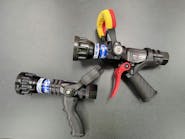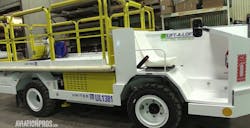Southwest will spruce up; $38.4 million revamp at RDU and other airports may put it further ahead
In the battle for airline supremacy, the latest skirmish is shaping up on the ground.
Specifically, the boarding gate. As the last place passengers spend time before boarding, gate areas are notably barren. Rows of seats, a television airing CNN loops and a counter for gate agents -- that's about it in most terminals, including Raleigh-Durham International Airport.
Southwest Airlines wants to brighten that landscape with a $38.4 million revamp at RDU and elsewhere that some industry analysts say could prompt similar moves by other carriers.
"Southwest is turning their gate areas into virtual airline clubs where no membership is required," said Henry Harteveldt, vice president of travel research for Forrester Research in San Francisco.
"If the other airlines don't wake up from their marketing comas, they'll lag even farther behind Southwest than they are today."
By the middle of next year, the nation's most successful low-fare carrier plans to redesign its gates with family areas that will offer child-size tables and chairs and televisions showing children's programs.
Oversize leather chairs will replace the stiff seating that lines most gate areas, and work tables equipped with power outlets for laptops and other electronics will be added.
"We're calling it our extreme makeover, Southwest style," chief executive Gary Kelly said when the program was unveiled last month.
The motivation is twofold.
Southwest wants to attract business travelers, who are more likely than leisure travelers to buy the most expensive tickets. But unlike most other large airlines, Southwest does not offer exclusive terminal lounges for its best customers.
Southwest also is reworking its gate areas around new boarding procedures that it began last week. The airline, which does not assign seats, is hoping that by giving passengers a number for boarding preference, it will eliminate the practice of people standing in long lines at the gate waiting for a chance at the best seats on the aircraft.
"The customer experience begins when they step into an airport. The service they receive at the ticket counter and gate area, as well as the airplane, are all equally important," Southwest spokeswoman Brandy King said.
Southwest is taking a cue from shopping malls that offer play areas and Internet access to attract customers and build loyalty. Much like retailers that lease space in the malls, airlines lease space in terminals, and the level of amenities offered is mostly up to individual carriers.
Retailers typically have leases of a year or more, but at RDU, nearly all the airlines lease space by the month.
The short-term leases could help explain why airlines have been slow to make expensive upgrades to their gates. But some industry experts said the areas simply haven't been a priority -- even if it meant missing a chance to build passenger loyalty.
"Most times, the airlines aren't interested," said Pauline Armbrust, chief executive of Armbrust Aviation Group in Florida, which publishes Airport Revenue News.
"It costs them money, and the airlines are more concerned with getting people from Point A to Point B. But the more services you provide your passengers, the better off the airline will be in this competitive environment."
Industry experts said Southwest's tactic is shrewd because the most-needed item in today's terminals is also inexpensive: electric outlets.
That's because all but the newest terminals were built before the proliferation of the electronic gadgets -- DVD players, iPods, BlackBerries, cell phones, laptops -- carried by today's passengers.
According to Forrester Research, 60 percent of business travelers carry laptops, and 95 percent have mobile phones. But outlets for charging the devices before a long flight haven't kept pace.
Still, competitors such as American, Delta, Continental and US Airways aren't planning gate upgrades, choosing instead to let business travelers pay to use their lounges. Annual fees at American's Admirals Clubs start at $300; Delta's Crown Club begins at $400, and one-day passes range from $25 to $50.
"Because we haven't changed the boarding process and it's well-received and gets high marks from passengers, we haven't felt the need to change the amenities," said American spokesman Tim Smith.
Lisa Beutler, a California State University administrator in Sacramento, said having gates equipped with connections for her laptop could influence which carrier she chooses, particularly with the delays that have become almost routine.
"It would make a difference if there was not a large [fare] cost differential," Beutler said as she worked on her computer while awaiting a flight last week at RDU. "Productivity is extremely important, particularly when you have long layovers. Sometimes I'll take a more expensive airline if my productivity is improved."





